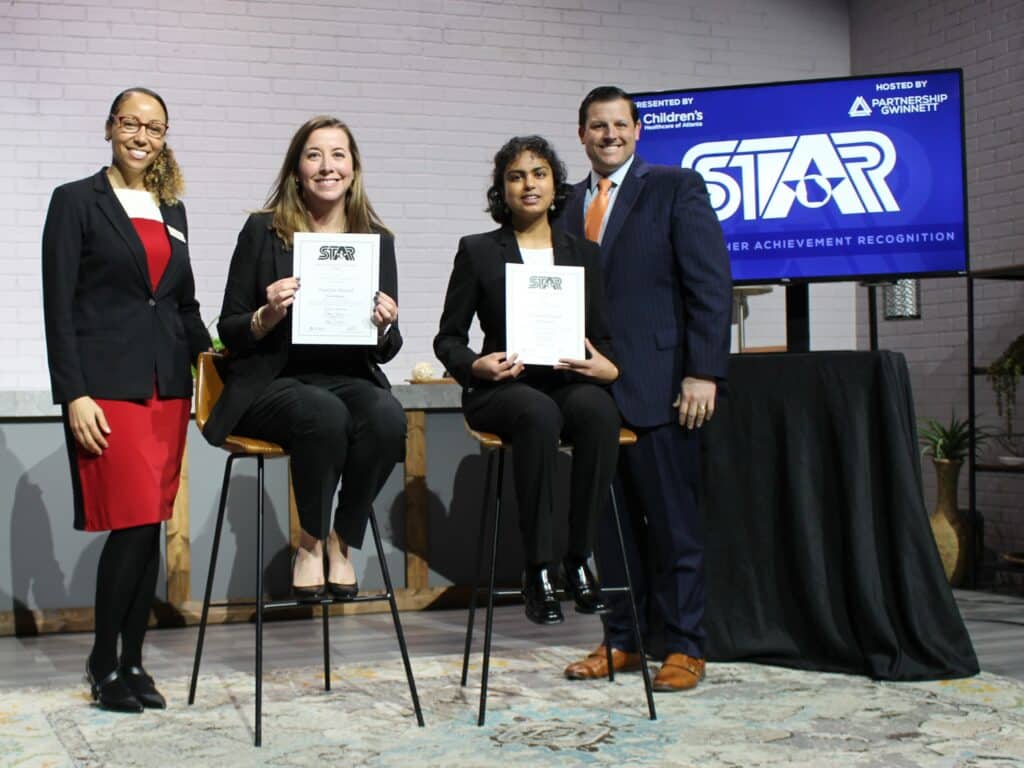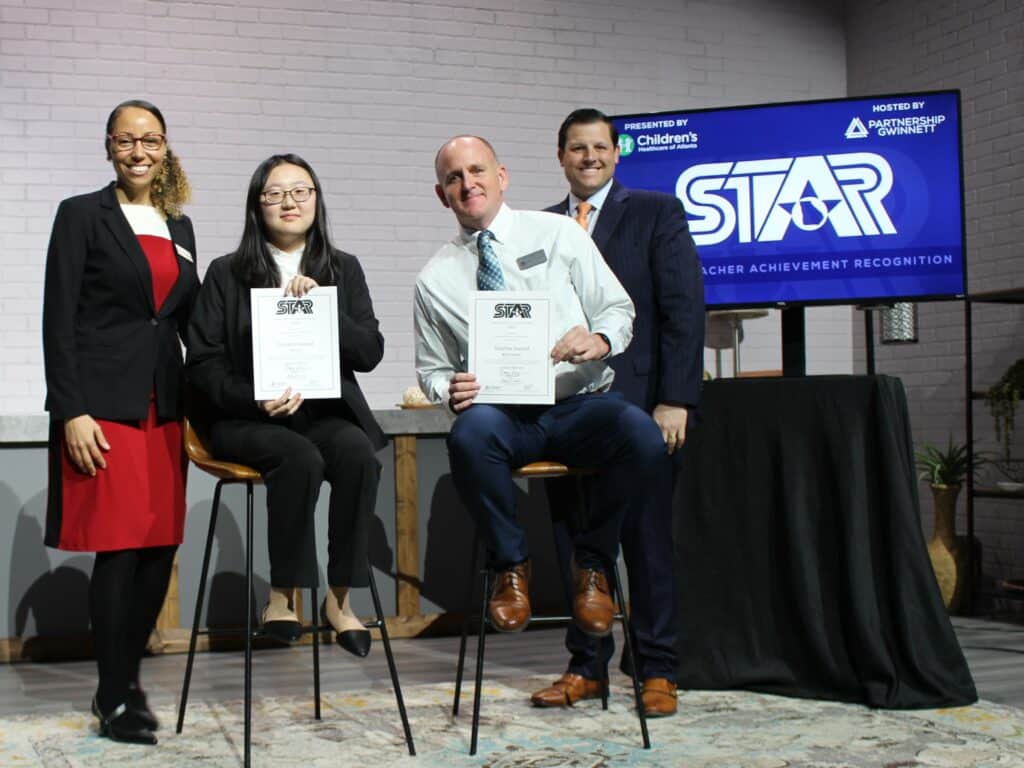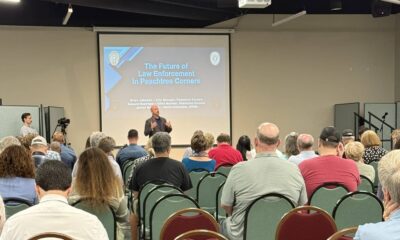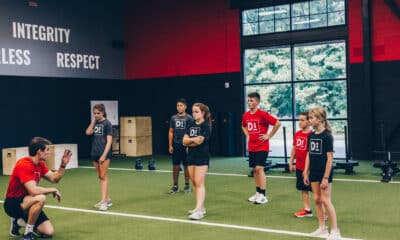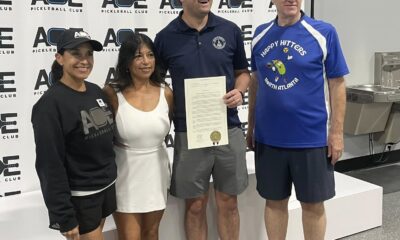Gwinnett County News
How Gwinnett’s Superior Court is Getting Back to Work
Published
4 years agoon
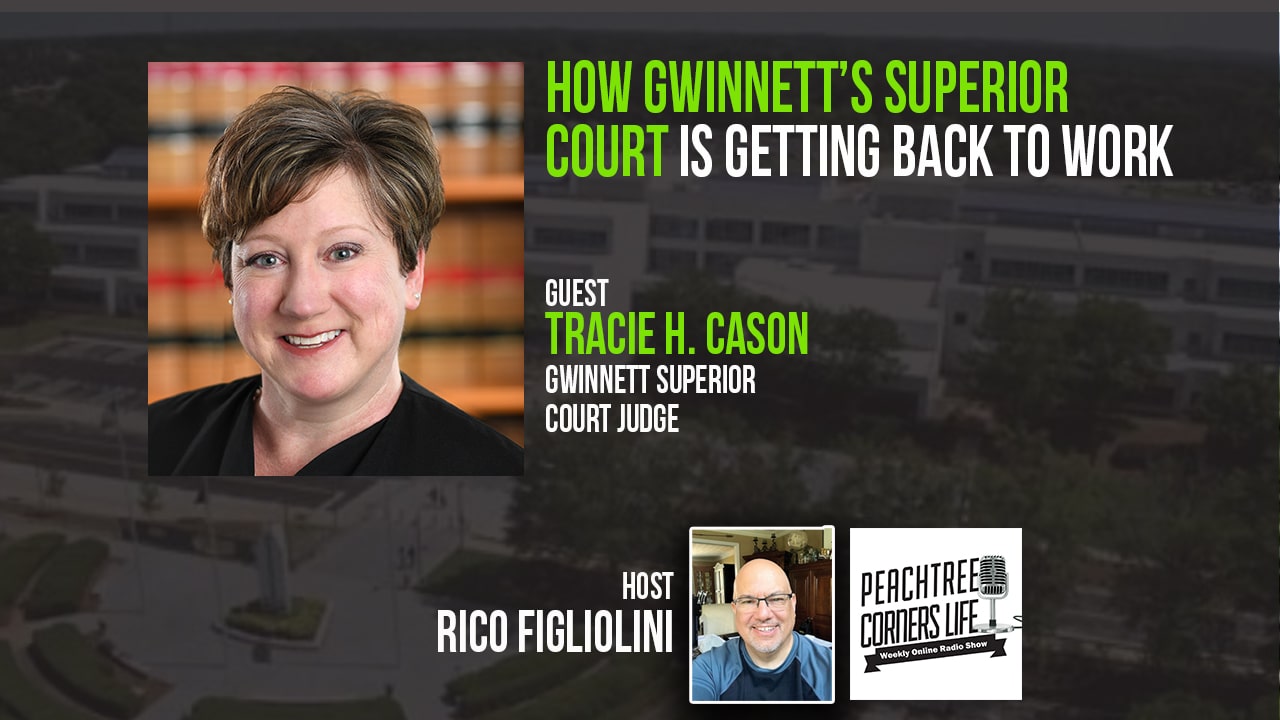
An interview with Gwinnett Superior Court Judge Tracie H. Cason
Gwinnett County Superior Court Judge Tracie H. Cason. talks about her first-hand experience moving into her position in 2018 and what the courtrooms were like during the COVID pandemic and now during the reopening of the courts and jury trial.
Join Rico Figliolini on this latest podcast of Peachtree Corners Life.
Resources:
Website: www.TracieCason.com
Timestamp:
[00:00:30] – Intro
[00:02:48] – Tracie’s Experience
[00:06:14] – Learning How to Be a Judge
[00:08:11] – Adjusting to COVID
[00:22:44] – Video versus In-Person
[00:30:22] – Closing
“I honestly think even though the video has given us the opportunity to do a lot more over COVID than we ever could have, I think justice ought to be personal. I think you should have your day in court to be fully heard by the court and you just get a better sense of people when you can see them in person. That’s not to say that some video options aren’t more efficient for maybe some more of the mundane hearings. But I’m really glad to be getting back to full in person court hearings.”
Tracie H. Cason
Podcast Transcript:
Rico: [00:00:30] Hi everyone. This is Rico Figliolini, host of Peachtree Corners Life. This is a great day in the city of Peachtree Corners, just before the 4th of July. We decided to record this for a live simulcast, this coming week with a judge that’s on the Gwinnett superior court. And she’s going to be talking to us a bit about how the court system was affected by COVID. But also coming out of it, how the court system is going to be addressing jury selection and all that stuff. So we’re going to learn it together. I’m going to be asking questions and so stay with us and learn a bit more about what’s going on in Gwinnett County court systems. And this is brought to you by Peachtree Corners magazine, a magazine that I published six times a year. We’re working on our next issue, that’ll be out the first week in August. It’ll have all sorts of information in there about the Peachtree Corners festival, light up the corners and a few, quite a few other good features. So hang in there with us. Let me introduce our guest, Tracie H. Cason. Hey Tracie, how are you?
Tracie: [00:01:32] Good afternoon, how are you? Or good evening rather.
Rico: [00:01:35] Yeah. We are recording this at about seven o’clock at night. It’s not raining or anything. It’s beautiful outside.
Tracie: [00:01:41] It is. Yeah, absolutely.
Rico: [00:01:43] Hopefully you had a good day out there in Gwinnett county.
Tracie: [00:01:46] Not bad, not bad.
Rico: [00:01:48] Great. So Tracie was actually elected in 2018 in a contested race. Interestingly enough, she was on our podcast April of, I think it was April the 12th, 2018. So you can check out that old podcast. Or, you know, there’ll be more podcasts coming along because your election is actually coming up next year, right?
Tracie: [00:02:08] Right, next May.
Rico: [00:02:10] So even though it is a non-partisan seat and a non-partisan race you know, people should be aware of that. It’s not, there’s no primary. So this goes out onto an election in May of next year, right?
Tracie: [00:02:23] Right. The judicial races are on the primary ballot because we are non-partisan. So if you want to vote for a judge, you can’t wait till November. You have to vote in May.
Rico: [00:02:34] That’s right. So you have to get out and vote. And so you know, Tracie, you know, you’ve had a bit of time in the seat. I know you’ve been involved in the court system before that obviously for I think, close to 20 years or a little bit more than that.
Tracie: [00:02:47] Right.
Rico: [00:02:48] So you know when, what I’d like to know is once you, because people run for all sorts of things and once they get in a seat, they start realizing maybe it’s not quite what they thought it was. There’s different things going on, different dynamics and stuff. So maybe you could share with us to begin with what, you know, how it felt to be you know, sworn in your first few weeks. And because that was only about a year, two years. Well, two years before COVID struck, right?
Tracie: [00:03:18] Right.
Rico: [00:03:18] So tell us a little bit about how that was at the beginning and you getting into the seat there.
Tracie: [00:03:24] Well, sure. I was sworn in at the very end of 2018, but of course took office at the beginning of 2019. I was fortunate enough to have been sworn in by the judge that actually swore me into the practice of law. So that was super special. And he was an individual that had mentored me actually through high school. And so it was so special to have him swear me in to the bench. I kept the staff of the judge who I replaced and they are phenomenal. And they have made all the difference in the world in my transition from being a practicing lawyer, to being a judge. They knew how the office ran. They knew the procedures of how cases got scheduled. And so that was a huge help to me. So I could just step in and actually start learning how to do my job and didn’t have figure out how to train the staff to run the office.
Rico: [00:04:24] Is that normal Tracie? For that to be like that?
Tracie: [00:04:27] I think, there’s a hybrid. When a judge comes in that has a staff, if they’ve been in private practice, they will generally bring their staff with them because they want to take care of the people they’ve worked with. And they’re comfortable you know, with them. I was fortunate that I came from the DA’s office and I didn’t have a staff that I needed to be taking care of. So I spoke to the staff that the previous judge, judge Turner had. And I was like, there’s no reason for me to get rid of y’all. We’ll work together and see how we get along. And if we get along, that’s going to be fantastic. And if we need to make a change, we’ll discuss it then. And thankfully we got along great. They’re fantastic. The key to a good judge’s office is their staff, honestly, because they’re the people that keep things running. And I was just very fortunate to have such a fantastic staff.
Rico: [00:05:22] Yeah. That makes sense. You know, this way all you need to do is show up really, and know the case and take care of the case and not have to deal with the details of judging. Because I think people don’t understand sometimes it’s, they think it’s just, you’re sitting on the bench, but there’s a whole lot going on behind that, right?
Tracie: [00:05:42] Absolutely. And I didn’t realize that. That’s one of the biggest surprises to me. Because I only saw the criminal side of what the judge did because that’s what I practiced in. I mean, I obviously knew that they handled civil and domestic, but I just had no idea of the volume. Particularly of the domestic case load and just the scheduling and rescheduling and working, trying to get cases fit in, depending on how much time they need. That was a huge eye-opener to me.
Rico: [00:06:14] Were you, so 2018 was a year really, before everything went sideways. During that time, did you find that you needed to make some changes? I mean, how did you cope with being in very different jobs than what you were doing before, in the DA’s office?
Tracie: [00:06:32] So I didn’t make any changes with the staff, but clearly I had to learn two new areas of the law that I had no experience in. Civil and domestic. And luckily we have some good law books. Some treatises that we all use, that we all reference to. Even the lawyers there’s a book for domestic called McConaughey. Everyone references that. So I read that and was able to get up to speed. And the counsel of superior court judges has some great training opportunities as well. And all new judges go through a two day new judge orientation, where we get training in office management, case management, you know, transitioning to that new position. So we had some good resources. And honestly, my staff attorney was instrumental in getting me up to speed on the civil and domestic as well. But I felt a little bit like I was back in law school. I mean, I had to study again and get up to speed and you get up to speed on each case because each case would present just a little bit different issue. And then finally was starting to get, I wouldn’t say completely comfortable, but a little bit more at ease with the job. And then of course COVID hit and that kind of changed everything.
Rico: [00:07:50] Right. Because, I mean, you had to deal. Now were you doing, you were doing jury trials too I would imagine, right?
Tracie: [00:07:57] Yes.
Rico: [00:07:58] So jury selection, jury trial, managing that whole aspect of it. And then the domestic violence also a little bit different, more personal, maybe less of a jury trial, I would imagine.
Tracie: [00:08:11] Right.
Rico: [00:08:11] So when, so when COVID hit, what, you know the courts, I mean, they shut down? I mean, or they weren’t shut down for a little bit? I mean, what happened at that point?
Tracie: [00:08:22] So it was interesting. The Wednesday before the judicial emergency started, we had a superior court bench meeting where we discussed this issue is happening. We need to start putting things in place to handle it. So we had already started talking about staggering jury trials, staggering panels, not having, you know, four or five judges having jurors at one time. Of course we started that and then two days later, you know, the world came to an end almost with the judicial emergency. So I will say we, I don’t think any of us knew exactly how long that was going to last, what the extent of it would be. And so for the first two weeks we really didn’t do anything at all, except bond hearings for individuals who were being held without bond. We did emergency issues as it related to child custody or child safety. And any other emergency that we found was essential. That’s what the judicial emergency allowed us to do.
Rico: [00:09:35] In person?
Tracie: [00:09:38] Well, yes. We could do in-person or video. And what we did with our criminal cases is because our jail was already set up for video court because some judges had already been doing some video court for some other non jury matters. We were already set up for that. So all of our in custody, criminal cases were done via video.
Rico: [00:10:02] When you say via video it’s like, so that people understand, like zoom I guess? It’s interactive video?
Tracie: [00:10:08] Correct. Exactly. So the judge would be on video just like this, where we’re both on video, talking back and forth. The attorneys would be there via video as well. Some would be actually at the jail with their clients. Although I think probably for those first couple of weeks, they were not at the jail and everyone was via video. The emergency domestic hearings, we actually, several of us did those in person because you can’t get a full sense of someone and their credibility. It’s harder over video. And so I made it a point that if I had an emergency, it was going to be in person. But everyone wore masks. We were social distancing. We were wiping down, we were Lysol-ing. And that was for the first really, the first, I would say month or two. That’s kind of what we worked under. Once we realized this was going to be a longer term issue, then we started buying supplies. Ordering plexiglass. Of course, more masks, gloves, Lysol that we could find. And of course, everyone in the world was scrounging for all of those same things. But the one thing that I’d love for our citizens to know is Gwinnett County courts never stopped working. With the exception of three days that we closed the courthouse down for a deep cleaning. But even on those three days, the law allows us to set an alternate court site. And we had an alternate court site in clerk’s office, out at the jail. And so really Gwinnett courts never stopped working during this entire pandemic. And then as the judicial emergencies evolved, each judge just tried to figure out how best to manage their caseload. Obviously, our priority were folks that were being held in jail without bond. Or we would do pleas where the plea offer allowed the individual to get out of jail either on a time serve situation, or they were just pleading to probation. So anything where we could get folks out of jail, that was our first priority. And then our second priority of course, were emergencies with individuals, custody issues, child emergencies, those kinds of things.
Rico: [00:12:36] So when when you were dealing with juries, I mean, were you dealing with juries?
Tracie: [00:12:39] We were not, no. So that very first judicial emergency halted all jury trials. It allowed any trial that was currently in progress to continue. But it halted all new jury trials. And in fact, we have had 15 judicial emergency orders because each order was only good for 30 days. That’s all the law will allow. And then the chief justice would have to extend it. So we’ve had 15 of them. It just expired yesterday. Our last judicial emergency expired yesterday, as of course did the statewide health emergency. And that was deliberate. The chief justice, you know, always had said as long as we’re under a statewide health emergency. Then the courts will be operating under some type of judicial emergency.
Rico: [00:13:30] And yesterday was June 30th. So that was good for those listening right now.
Tracie: [00:13:35] Right. But of course, as we have progressed through this, after a few months that judicial emergency lightened up a little bit, when we thought we were getting the numbers under control. Unfortunately, after the chief justice allowed jury trials to resume. And I want to say that was at the end of last year. Unfortunately, our numbers skyrocketed again after of course the Thanksgiving – Christmas break and into January, and then the chief justice halted jury trials again.
Rico: [00:14:16] Are you, worried at all about the was it the Delta variant that we’re talking about? That’s being talked about?
Tracie: [00:14:21] I think from what we’re looking at is more of a vaccinated – unvaccinated. And everything that I’ve been seeing indicates that for vaccinated individuals, they are protected against that variant as well. At least to the extent of, if they were to contract COVID, it would be a much less severe form of it.
Rico: [00:14:44] And there’s, and there’s no restrictions right? As of today, I guess, in the court system? Whether you’re vaccinated or not, or wearing a mask or not, there’s no official restrictions at this point.
Tracie: [00:14:55] There are no official restrictions. Of course, at one point, our chairwoman Hendrickson had a mask mandate within the courthouse building. But as a judge, I am in control of my court room. So I could still mandate masks in my courtroom, despite there not being a mass mandate anywhere else. But what we’re doing is most, if not, all of the judges are continuing to follow, of course, CDC guidelines. Which indicate that if you are vaccinated that masks are not necessarily recommended. If you’re not vaccinated, it is still recommended to wear a mask. But through the end of July, because we have sent out jury summons with our safety brochure in them, that we talk about the different safety measures that we are practicing. We will still maintain, for our jury selection for cases through the end of July, we will still mandate masks. We are still mandating social distancing, according to CDC guidelines. And we still have plexiglass and glass dividers in our jury box. Those will remain through the end of July because we have given our assurances to potential jurors that we will keep them safe. Barring the numbers going back up and hopefully they won’t. August those restrictions will go away. We will still have masks available for jurors that want to wear them. We will still have of course hand sanitizing stations. We will still have Lysol wipes throughout the building and throughout the process. So we’re still cognizant that we still need to keep individuals safe, even though our numbers may be under control.
Rico: [00:16:49] It’s interesting being out there. I’m sure as you are that you know, going to a restaurant or with different places, we find that maybe what I’m seeing that maybe two thirds of the people aren’t wearing masks and a third of the people are possibly wearing masks.
Tracie: [00:17:04] Right.
Rico: [00:17:05] And it differs how well they wear it sometimes. And it differs, you know, the minute they come out of the store or the restaurant they’ll take it off. And some people just continuously wear it. I mean, at town center I see people walking around with masks the whole time, which is fine. I mean, everyone needs to do it the way they need to do it because they only know themselves, right? No one else knows, are they vaccinated not or do they feel more comfortable with the mask on. So I have one of my kids does that, he’ll come out with me sometimes he’ll wear his mask.
Tracie: [00:17:38] Right.
Rico: [00:17:39] Just because he feels he needs to for that.
Tracie: [00:17:41] Well, that’s right. And we’ve kept these safety measures in place a lot longer than private businesses because we’re in a different position. You choose to go to a restaurant or you choose to go out shopping. But as a juror or certainly a litigant, a criminal litigant, we’re compelling you to come to court. And it is, you know, if you don’t answer that jury summons or you don’t come to court when you were given a criminal notice to be in court, you could be arrested subject to a bench warrant. Or with jurors certainly if you don’t show up, then you’re going to get a show calls notice. So it’s not a voluntary thing. So we have had our safety measures in place longer because we don’t give people a choice. Now what we are doing, and we’ve done this even pre-COVID. If there are certain exemptions to jury service, if you have a chronic health condition that would prohibit you from serving, if you could provide proof of that, then you would be excused. It’s even if you get a notice and you had a vacation planned for that week that you got summoned, you can get a one-time deferral. So our jury assembly has worked with people in the past, and they’re continuing to do that with COVID even as our numbers improve. If a juror gets a summons between now and really probably the next three or four months, and they still have a concern about COVID, we’re going to give them a one-time deferral. No questions asked, no documentation. We’re going to give you a one-time deferral.
Rico: [00:19:19] And how often can a person actually be called to do jury duty in a period of time?
Tracie: [00:19:26] It’s random. And so I’ve been called twice in the last 20 years, but then I’ve talked to people that have been called every year. So it’s completely random.
Rico: [00:19:39] It’s like winning the Georgia lottery except you’re compelled to go. I’ve only been called once. And the interesting part to me was, I think it was a criminal case. And they asked me, where are you from? I’m like, I’m from New York. And they were like, did you leave because of crime? I think it was the defendant. That was the defendant’s attorney that was asking me. And I said, yeah, it was pretty high crime and stuff. And I just, they told me they didn’t need me at that point. I thought that was funny. But yeah you know, so, and my wife’s never been called I think.
Tracie: [00:20:16] It’s just completely random.
Rico: [00:20:18] Yeah. But you know, coming out of this and doing where we’re going. I mean, so you’re still allowing the court system is still allowing for two, three months more of possibly? You know, by that point, we’re going to be going into the fall, right? So this is, you know, July. So July, August, September, October, November, where everyone’s going to be indoors anyway, there’s really no room to be able to socially distance. Right. So we do that?
Tracie: [00:20:48] Our social distancing rules will probably only go through the end of July because that’s what we’ve told the current jurors. The jurors that will be summoned between now and the end of July have gotten and already received their summons, excuse me, with our safety flyer. And we just didn’t feel like just because we’re no longer under that state health wide emergency, we’ve promised these safety measures in place. And then we didn’t want jurors to show up and we no longer have those safety measures in place. That wasn’t right. So that’s why we’re going to maintain them through the end of July. But come August. We’ll no longer be under those restrictions. So we won’t be, we’ll be able to be back to our normal number of jurors that we’re summoning. Which will be, could be up to 400 a day. Now we have a brand new jury assembly room. It’s funny because we began construction on a new court annex building, probably I guess, I mean, we started demolishing back in 2018 and then started building 2019. And that has continued, but no one’s been at the courthouse of course, for most of 2020. Because a lot of things were done virtually. And so during the pandemic, a whole new courthouse annex has arisen behind the main courthouse. And in that annex, we have a brand new, improved, much larger jury assembly room that can accommodate, I think the number’s up to 588 individuals. So we’re going to be back full speed hopefully August and September.
Rico: [00:22:44] So, let me ask you this. You said that some of the judges were using video at some point, because with prisons and going back and forth. Maybe this way there was not necessarily, probably not necessarily, to transport the prisoner to the court. And that was easier, right? In most cases, I guess, to do that? So during the COVID time of using expanded use of video for a lot of different things, for everything, right? Did you all find that possibly, like private companies now are finding, that they are doing creating hybrid jobs where people are working three days in two days remote? Because that seems to work well. It gives, I guess the culture of COVID, if you will allows better living to the employee that way. But also the productivity and a lot of these jobs has actually continued or even improved in some jobs, depending on the company. So do you all find that maybe that may continue a little bit?
Tracie: [00:23:41] I think it will. During the height of COVID a lot of judges, myself included, decreased the staff that we had in the building. And right before COVID hit, the county had transitioned from desktop computers to laptop stations for everyone. Which kind of was serendipitous because our employees were able to then take those laptops home and they would still be connected to our network and could do everything at home that they could do sitting at their desks. And so when COVID hit most judges had all of their staff working remotely. Some judges just had one staff and would alternate between their staff who was going to be in the office. And I did that as well, so that we wouldn’t have everyone out at one time because obviously if one person were to get COVID, that would threaten the entire office. And some judges even worked remotely depending on what they were doing. Some judges even had court remotely. The law requires that we had open court rooms. And so even if a judge was working outside of the courthouse, some judges had YouTube channels that would still maintain that open to the public courtroom requirement. They would publish that YouTube station with that calendar so anyone could watch. I had to actually work from home for a possible exposure. Thankfully, I didn’t have COVID, but I had one staff that didn’t have a possible exposure. So I was sitting like where I am now, but it was being broadcast in an open courtroom at the Gwinnett Justice and Administration center. So it could comply with our open courtroom requirement.
Rico: [00:25:36] So anyone that wants to walk into that courtroom would see this big TV, you know, and be able to watch the case there versus. Now would I have been able to go on YouTube and find your link to see the live stream? I’m assuming.
Tracie: [00:25:51] I did not do YouTube. But because I was broadcasting it in an open courtroom, I satisfied that constitutional requirement. For the judges that for some reason, didn’t have a staff member that could do that, then they would broadcast via YouTube and that was published with their calendar so any public member could get that information and log on and see that court stream.
Rico: [00:26:15] So it wasn’t, was it a live feed?
Tracie: [00:26:18] It was yes. Yes.
Rico: [00:26:20] So what I’m finding, what I’m hearing then is that during this time there were live feeds it just depended on whether the judge was doing it live on YouTube or whether it was live right in the court that people could go there and watch it. And so do you find, did you find that, I would imagine that that’s useful, right? That a bit of hybrid of this type of stuff is a useful thing?
Tracie: [00:26:43] Oh, absolutely. There are some judges that are more technologically advanced and like that method. Some individuals work better at home without the distraction. I think like a lot of companies have found you don’t have employees that are chit chatting or taking a lot of breaks. They tend to be more efficient at home. I personally don’t like working at home. I like going into the office and me and my staff attorney were in the office pretty much every day. And we were in court. I had a lot of in-person meeting, court hearings over the last 15 months, but it was the only case in the courtroom. We were social distanced, wearing masks with all the precautions in place. But I had probably a lot more in-person hearings than most of my colleagues did. And it’s funny. I’m probably the youngest, I think, on the bench, but I’m the least technologically savvy. I like old school. And I honestly think even though the video has given us the opportunity to do a lot more over COVID than we ever could have, I think justice ought to be personal. I think you should have your day in court to be fully heard by the court and you just get a better sense of people when you can see them in person. That’s not to say that some video options aren’t more efficient for maybe some more of the mundane hearings. But I’m really glad to be getting back to full in person court hearings.
Rico: [00:28:25] Yeah. I would think that that, you know, it makes a lot of sense. I think that even as a, I think that if I was in that case where I had to be in court or where I was compelled to be there, I certainly would want to be able to see that judge in person.
Tracie: [00:28:41] Right.
Rico: [00:28:42] So then it’s a, I think it’s a fair, like you said, a fair judgment of someone to be able to do that versus video. Because video is so detached. And I mean, even we find that kids can bully people on these chat rooms on these video things. Cause it’s just easy to do that.
Tracie: [00:29:02] Well, and there was a situation, I think it was in Ohio where they were doing a bond, a bond revocation hearing I believe of an individual that was out of custody. And they were doing it all by video and the prosecutor got a sense. She had her victim testifying and the prosecutor got a sense that there was someone else in the room with that victim. And sure enough, when they dispatched police to her, the victim’s home, the defendant was in the same residence.
Rico: [00:29:41] Oh wow, that’s, that’s a danger.
Tracie: [00:29:44] Yeah. You can’t control who’s in the room. And that’s why most of our judges only did video for criminal if they were in custody. Where we could control who was in the room with the defendant or where the defendant was.
Rico: [00:30:02] Yeah. That definitely makes a lot of sense. It just didn’t dawn on me, that aspect of it, but yeah. I mean, people will do whatever they need to do to game the system it seems.
Tracie: [00:30:11] They really will.
Rico: [00:30:13] Yes. And if there, and if it’s a criminal case, it’s not a surprise that they’ll do whatever they think.
Tracie: [00:30:20] That’s right.
Rico: [00:30:22] That’s the sad thing. Well, you know, I think we covered a lot of ground during this podcast, during this interview. Are there, is there anything Tracie that you’d like to share that we haven’t covered, that you want to bring out? That we haven’t, that I haven’t asked questions on?
Tracie: [00:30:37] Well, I think the big thing that the bench would like our community to know is that we understand people may still be a little bit hesitant. Obviously, COVID is never going to go away. Hopefully our numbers will continue to improve. We’ll continue to keep a handle on it. But we are keeping our community safe. But we need jurors. Justice needs jurors. We cannot do our jobs and our criminal justice system simply can’t work without our citizens doing their civic duty and coming to jury duty. And we’re trying to get that word out. That we are going to keep you safe. We do have protocols in place to do that. But we need our citizens to answer those summons and to come and serve on jury duty. You know, if you were charged with a crime, you would want the good people of Gwinnett to come so you can have your day in court.
Rico: [00:31:37] Yeah, it makes sense. Well said too. So we’ve been talking to Tracie Cason, a non-partisan Gwinnett superior court judge since 2018 elected through a contested race. And her race is coming up again next year. In May of next year so, and it, because it’s nonpartisan that election is not a primary in May like the rest of the election during that month. But it’s actually the definitive for those running for the judgeship. So if you want to find out a little bit more about Tracie, where can they go to find out a bit more about you?
Tracie: [00:32:13] Sure. I have a website, it’s super easy. It’s www.TracieCason.com. That has some more information about me. And certainly that has an email address on it as well. Happy to answer questions. I can’t answer questions about cases or, Hey, I have this relative that has this issue. But I’m happy to answer any other general questions people might have.
Rico: [00:32:35] Sounds good. Tracie, I appreciate you being on this podcast with me. Thank you so much.
Tracie: [00:32:40] Thank you. I appreciate it.
Rico: [00:32:42] Alright, take care.
Related

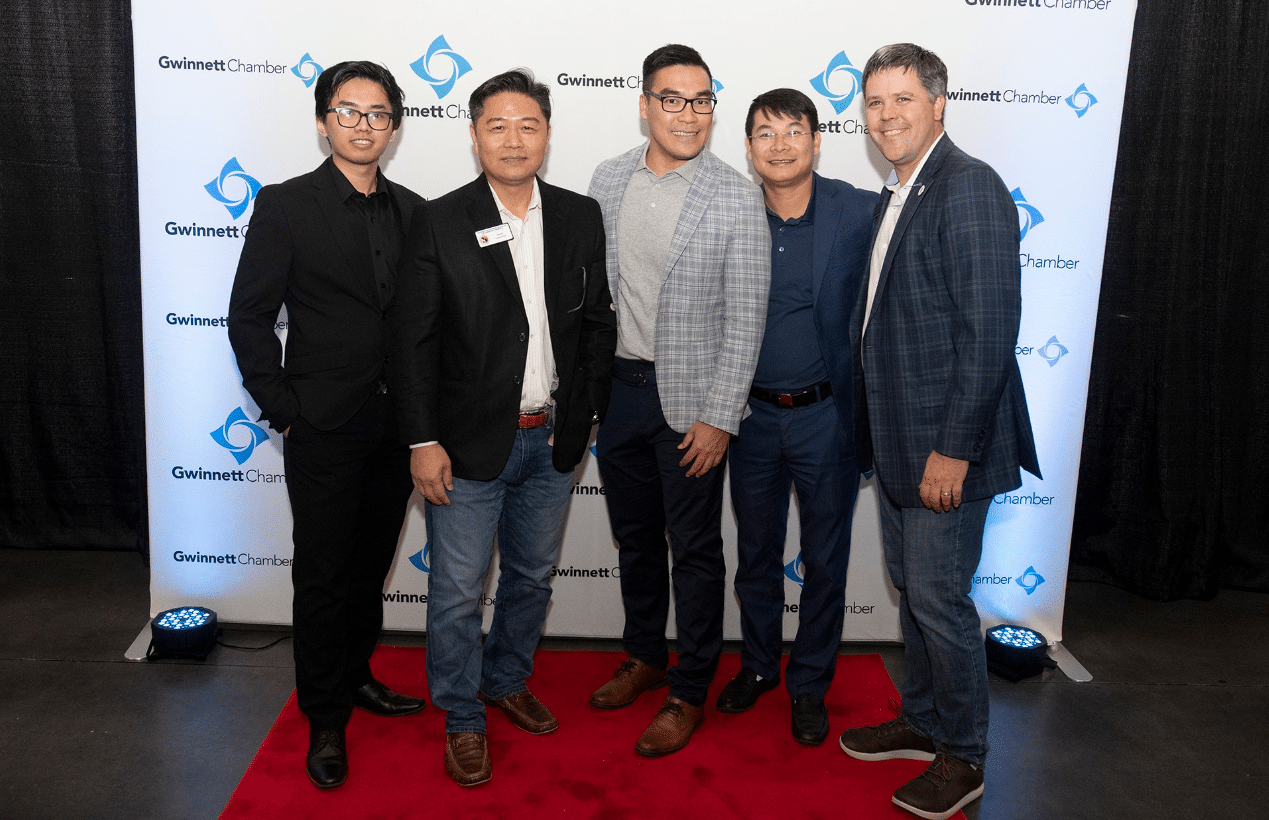
The Gwinnett Chamber is set to host the 2023 Multi-Chamber Mixer at After Hours, an end-of-year event designed to celebrate Gwinnett’s inclusive business community.
The program will be held at the Gas South Convention Center on November 1, starting at 5 p.m.
This program brings organizations from around the world together to celebrate Gwinnett’s diverse and international business community.
Partners in this event have historically included business groups such as:
- The Georgia Indo-American Chamber,
- Japanese Chamber of Commerce of Georgia,
- Korean American Chamber of Commerce of Georgia,
- Latin American Chamber,
- German American Chamber,
- French American Chamber,
- Georgia Hispanic Chamber,
- Georgia Pakistan Business Council,
- Liberian Community Association of Georgia,
- Atlanta Chinese Entrepreneurs Club and
- the Italy America Chamber Commerce Southeast, Georgia Chapter
“Collaboration with these organizations enables connection and a deeper understanding of business needs in our region,” added Gwinnett Chamber President and CEO Nick Masino. “We are pleased to partner with these entities in hosting an event designed to celebrate our collective success and ever-evolving growth opportunities.”
Registration is required to attend and includes international food tastings, drink tickets and networking with more than 300 business professionals. To register, please visit GwinnettChamber.org/Events.
Related
Around Atlanta
Gwinnett County Issues Proclamation for National Travel and Tourism Week
Published
2 years agoon
May 8, 2023
On May 2, Gwinnett County issued a proclamation declaring the week of May 7-13 as National Travel and Tourism Week (NTTW). The proclamation was presented to Explore Gwinnett, the official tourism and film office for the county.
The local initiative encourages support of the hospitality industry and will be held in conjunction with 40th anniversary of the U.S. Travel Association Industry event.
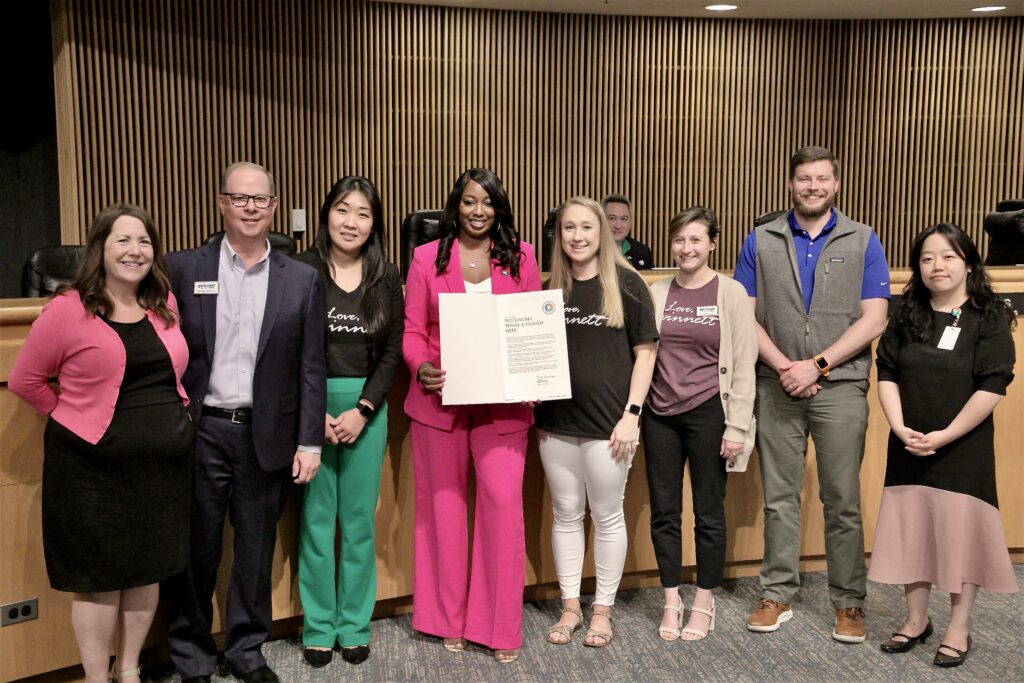
Throughout the week, Gwinnett residents are encouraged to recognize and support the hospitality businesses and their employees for their contribution to the quality of life of all Gwinnett citizens.
- More than 10,000 jobs are generated by Gwinnett’s hospitality industry.
- More than $83 million in state and local tax revenue is generated from travel and tourism is Gwinnett County and contributes to reducing the tax obligations of Gwinnett citizens.
- Gas South District is celebrating the completion of a $200 million expansion and renovation that will increase travel and tourism to Gwinnett County.
- Gwinnett County is home to three professional sports teams, more than 100 hotels, 12 craft breweries and countless restaurants.
Established in 1983, NTTW is an annual tradition to celebrate the U.S. travel community and travel’s essential role in stimulating economic growth, cultivating vibrant communities, creating quality job opportunities, inspiring new businesses and elevating the quality of life for Americans every day.
Related
Education
Partnership Gwinnett Celebrates Gwinnett County Students and Teachers
Published
2 years agoon
January 29, 2023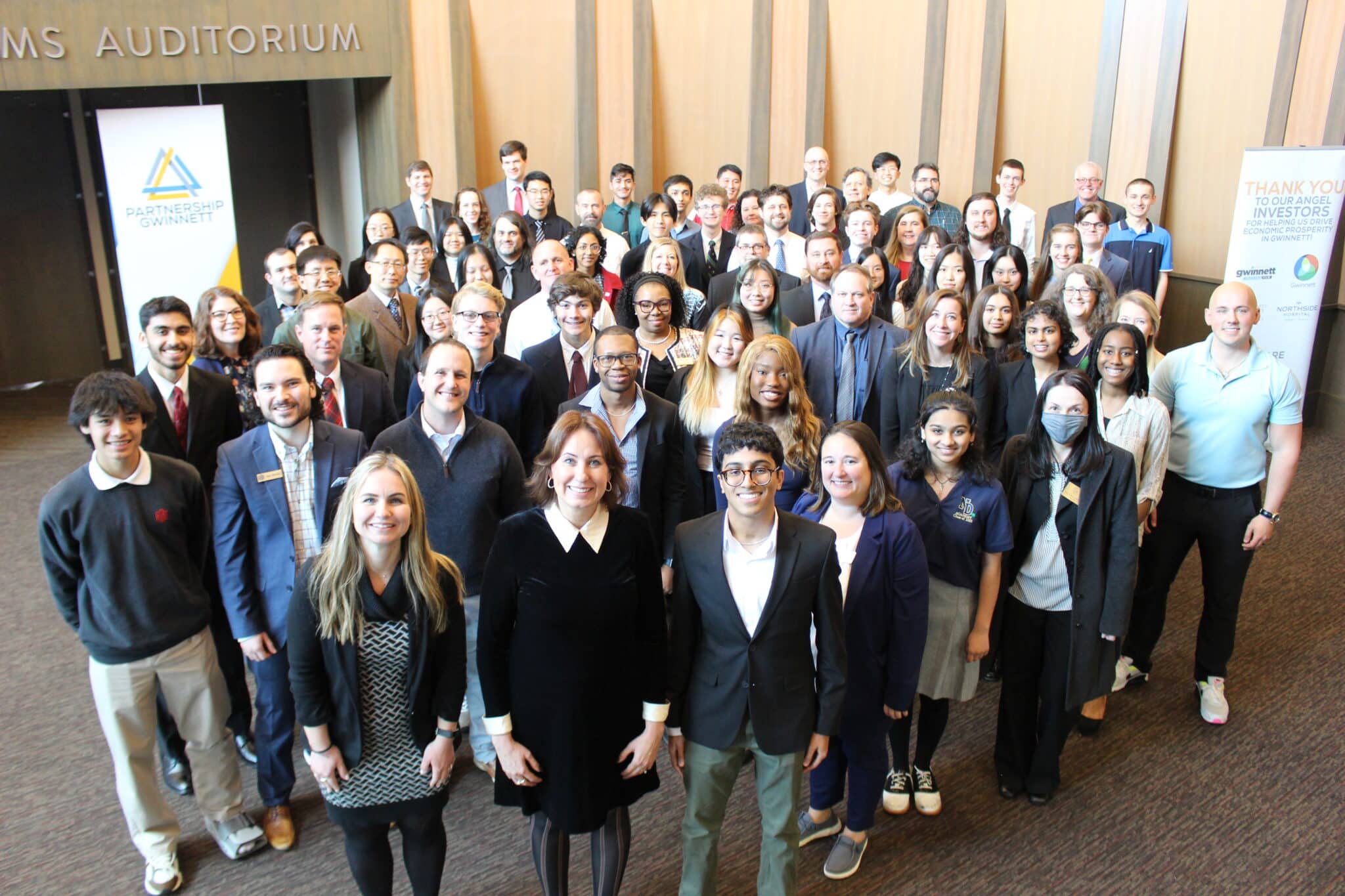
Student Teacher Achievement Recognition Reception honors 76 recipients from 32 schools.
On January 26, Partnership Gwinnett hosted the Student Teacher Achievement Recognition Reception, sponsored by the Professional Association of Georgia Educators and PAGE Foundation and presented by Children’s Healthcare of Atlanta, at the John C. Maxwell Leadership Center in Duluth.
More than 200 students, teachers and guests attended the annual event that honors the highest-achieving seniors and their most academically influential teachers.
“Gwinnett County boasts some of the best schools in the nation,” said Partnership Gwinnett Economic Development Vice President Andrew Carnes. “We are proud to celebrate and congratulate these talented students who represent our future workforce and the teachers who have made a difference in their lives.”
The presentation recognized 76 recipients from 32 schools, including Buford City Schools, Gwinnett County Public Schools, Greater Atlanta Christian School, Hebron Christian Academy, Killian Hill Christian School, Notre Dame Academy, Providence Christian Academy, Sugar Hill Christian Academy, Wesleyan School.
Honorees include:
Buford City Schools
- Erin Lim and Mr. Brent Leitsch – Buford High School
Gwinnett County Public Schools
- Dean Putnam and Mr. John Jameson – Archer High School
- Samad Ahmed and Mr. Gary Haynes – Berkmar High School
- William Li and Mrs. Mirela Kimbrough – Brookwood High School
- Niheer Patel and Mr. Chris Michael – Brookwood High School
- Farhan Baig and Mrs. Stephanie Timmons – Brookwood High School
- Mariabelle Azemar and Mr. Alan Dills – Central Gwinnett High School
- Sara Amou and Mrs. Danielle Wilcher – Collins Hill High School
- Cooper Brambley and Mr. Robert Winstead – Dacula High School
- Jerusha Titus and Mr. Thomas Curran – Discovery High School
- Mandy Xu and Mr. Jonathan Roy – Duluth High School
- Chikaima Anigbogu and Ms. Lindsey Saa – Grayson High School
- Jackson Lee and Ms. Kristen Brigmond – Gwinnett Online Campus
- May-Jann Wong and Mr. Donny Thurston – Gwinnett School of Mathematics, Science and Technology
- Erika Tay and Mrs. Laura Wood – Lanier High School
- Tracy La and Ms. Theresa Ryan – McClure Health Science High School
- Cristopher Miranda and Mr. Robert Ro – Meadowcreek High School
- Joshua Ha and Mr. Greg Marr – Mill Creek High School
- Evan Grove and Dr. Rick Creed – Mill Creek High School
- Bao Trinh and Dr. Nicki Collins – Mountain View High School
- Jordan Katz and Mr. Corey Fair – Norcross High School
- Sean Zhong and Ms. Michelle Larate – Norcross High School
- Aditi Venkatesh and Ms. Katie Massey – North Gwinnett High School
- Grace Liu and Mr. Jon Aldrich – Parkview High School
- Nathan Chen and Mr. Andrew Wright – Paul Duke STEM High School
- Rohan Pai and Dr. John Mobley – Paul Duke STEM High School
- Katharine Wang and Mr. Michael Crawford – Peachtree Ridge High School
- Phoebe Yoon and Ms. Rhonda V. Perry – Seckinger High School
- Jessica Duong and Mr. Isaac Kwak – Shiloh High School
- Dominique LoBlack and Ms. Natilee Brown-Van – South Gwinnett High School
Private Schools
- John Alsobrook and Dr. Derek Wilson – Greater Atlanta Christian School
- Jackson Rosero and Mr. Samuel Vernhes – Greater Atlanta Christian School
- Peter Lee and Mr. Taylor Kulp – Hebron Christian Academy
- Shalena Lam and Mr. Matthew Lewis – Killian Hill Christian School
- Riddhi Akshara and Mrs. Elena Ouimette – Notre Dame Academy
- Lydia Panek and Mrs. Renee Sargent – Providence Christian Academy
- Benjamin Jones and Mrs. Sherry Wiltshire – Sugar Hill Christian Academy
- RJ Devlin and Mr. Joseph Cooper – Wesleyan School
PAGE Educational Membership Services Representative Laurie Provost also announced the system winners — Erin Lim and Mr. Brent Leitsch from Buford High School and Aditi Venkatesh and Ms. Katie Massey from North Gwinnett High School — who will compete for region honors. Region winners will then compete for state honors.
The PAGE STAR honors the highest-achieving high school seniors and their most academically influential teachers. Students must have the highest score on any single SAT taken through the November test date of their senior year with their SAT scores equal to or higher than the 2022 national average scores on the evidence-based math and reading and writing sections, as well as rank in the top 10% or top 10 students of their class based on their GPA.
Related
Read the Digital Edition
Subscribe
Keep Up With Peachtree Corners News
Join our mailing list to receive the latest news and updates from our team.
You have Successfully Subscribed!

Digital Edition

Official City Merchandise Line Debuts This Saturday at Town Green

Paul Duke STEM High School Student Earns CGO Scholarship

World Blood Donor Day Starts Here: Theo’s Miracle, Katherine’s Mission [Podcast]

Executive Function: A Tribute to Working Moms

Peachtree Corners Grows Business Opportunities Through Economic Development

Peachtree Corners Hosts Discussion About the Future of Local Policing

Simpson Elementary Marks Exceptional Children’s Week

Local Special Olympics Pickleball Team Honored with State House Resolution

Atlanta’s Dog Howl-O-Ween Festival Moving to Peachtree Corners for 2025

D1 Training Brings New Fitness Concept to Peachtree Corners

Peachtree Corners Hosts Discussion About the Future of Local Policing

City of Peachtree Corners Awarded Certificate of Achievement From GFOA for Seventh Straight Year

Simpson Elementary Marks Exceptional Children’s Week

Executive Function: A Tribute to Working Moms

Official City Merchandise Line Debuts This Saturday at Town Green

Light up the Corners [Video]

Capitalist Sage: Business Leadership in Your Community [Podcast]

Cliff Bramble: A Culinary Adventure through Italy

Top 10 Brunch Places in Gwinnett County

A Hunger for Hospitality

THE CORNERS EPISODE 3 – BLAXICAN PART 1

Top 10 Indoor Things To Do This Winter

The ED Hour: What it takes to Remove Barriers from Education

Peachtree Corners Life
Topics and Categories
Trending
-
City Government3 days ago
Peachtree Corners Hosts Discussion About the Future of Local Policing
-
Fitness2 days ago
D1 Training Brings New Fitness Concept to Peachtree Corners
-
Pets & Animals1 day ago
Atlanta’s Dog Howl-O-Ween Festival Moving to Peachtree Corners for 2025
-
Sports10 hours ago
Local Special Olympics Pickleball Team Honored with State House Resolution




